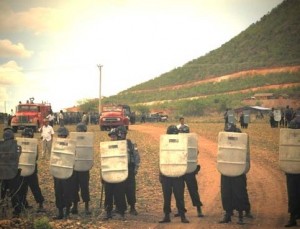Protests Against Controversial Chinese Copper Mine Resume
Originally appeared in DVB
February 14, 2013 Local villagers and activists resumed their demonstrations against a Chinese-backed copper mine in central Burma on Wednesday, as anger continues to grow over the government’s failure to address community grievances over the project.
Local villagers and activists resumed their demonstrations against a Chinese-backed copper mine in central Burma on Wednesday, as anger continues to grow over the government’s failure to address community grievances over the project.
Hundreds of villagers gathered near Sagaing division’s Monywa copper mining project yesterday to demand a complete halt to the project, which locals say has caused irreparable damage to the local environment and communities. There is growing anger over the government’s failure to address their concerns, despite the formation of an official investigative body.
“We are rallying to demand the complete suspension of the mine,” said one protester, adding that local peasants must unite rather than rely on outside help.
It follows mass protests over the summer against the Latpadaung mine — a joint-venture between the military-owned Union of Myanmar Economic Holdings Ltd (UMEH) and the Chinese Wanbao company. Campaigners say the project has resulted in more than 7,800 acres of land being grabbed from 26 villages across the nearby mountain range.
The mining project rose to infamy after the government ordered a brutal crackdown on protestors in November last year, resulting in dozens of monks being seriously burned. Police were accused of using water cannons and throwing incendiary devices against the peaceful protestors, before forcing them off the site.
Recent media reports suggest that security forces may have used some form of white phosphorous – a chemical munition that can cause serious second and third degree burns — against the protestors. A report cited in the Irrawaddy today, accused the police of using devices that “sparked and fizzled like fireworks”.
“Everything that the fireballs touched instantly burst into flames despite the area being soaked in water. The covering tarps and blankets used by protesters for shelter and protection caught fire. The monks’ robes and villagers’ clothing also caught fire,” said the report.
Over 100 monks are believed to have been injured in the crackdown, which caused national outrage and forced senior government ministers to publicly apologise. A number of the monks are currently being treated for severe burns in Bangkok hospital, with financial assistance from local charitable organisations.
An official commission – led by opposition leader Aung San Suu Kyi – was set up to investigate the clashes as well as the project’s social and economic sustainability. But last month, it delayed the release of its final report for the second time, which has led to a growing backlash from local activists. Others are angry that an interim report submitted to President Thein Sein on 31 January was not publicly released.
“We don’t know how the [Latpadaung] investigation commission report will turn out; whether good or bad,” said one of the local protestors. “So rather than relying on someone else to support our interests, we would like to make a display with this rally that all residents in the 26 villages in the area are united in their wish to put a complete stop to the Latpadaung mining project.”
The Wanbao mining company is lobbying heavily for the re-opening of the Latpadaung mine, which was temporarily suspended after the crackdown, and they say it has lost them USD$ 2 million per month since.
Suu Kyi has also previously suggested that Burma should honour its commitments to foreign companies — even though many of the deals were struck by the former military junta. “If we unilaterally break off ongoing projects, we stand to lose international trust,” she warned in November.
President Thein Sein has been credited for introducing a number of democratic reforms in Burma since March 2011, including easing restrictions on the right to protest. But peaceful protesters are still required to seek permission five days in advance, and many land rights activists, who have breached these regulations, have been sentenced to jail.
View the original article here.
Tags: Letpadaung Copper Mine, ProtestThis post is in: People's Voices
Related PostsICTJ Paper Looks at Range of Options for Dealing with Myanmar’s Troubled Past
Myanmar: Letpadaung Mine Protesters Still Denied Justice
Land Confiscation Continues Unabated Across Southeastern Burma
Amnesty International Oral Statement on Myanmar to the 28th session of the Human Rights Council
Press Release: Justice Trust









 All posts
All posts